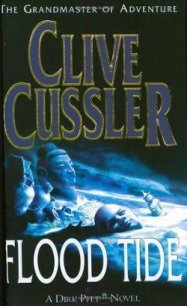Black Wind - Cussler Clive (читать книги онлайн без сокращений TXT) 📗
Lying central to the North Pacific currents, Yunaska was an ideal location for tracking sea and atmospheric conditions that would brew into full-fledged weather fronts as they moved eastward toward North America. In addition to collecting weather data, the Coast Guard station also served as a warning and rescue relay station for troubled fishermen working the surrounding marine-rich waters.
The site could hardly be considered a paradise for the two men assigned to man the station. The nearest village was ninety miles away across open water, while their home base in Anchorage was more than a thousand miles distant. The isolated inhabitants were on their own for a three-week stint until the next pair of volunteers was airlifted in. Five months out of the year, brutal winter weather conditions forced closure of the station except for minimal remote operations. But from May to November, the two-man crew was on call around the clock.
Despite the seclusion, meteorologist Ed Stimson and technician Mike Barnes considered it a plum assignment. Stimson enjoyed being in the field to practice his science while Barnes relished the time off he would accrue after working a station shift, which he would spend prospecting in the Alaskan backcountry.
“I'm telling you, Ed, you're going to have to find a new partner after our next R&R. I found a fissure of quartz in the Chugach Mountains that would knock your socks off. I know there's got to be a thick, juicy gold vein lying right beneath it.”
“Sure, just like that strike you made wild claims about on the McKinley River,” Stimson chided. Barnes had a naive sense of optimism that always amused the elder meteorologist.
“Just wait till you see me driving around Anchorage in my new Hummer, then you'll believe,” replied Barnes somewhat indignantly.
“Fair enough,” Stimson replied. “In the meantime, can you check the anemometer mounting? The wind readings have stopped recording again.”
“Just don't file a claim on my gold field while I'm up on the roof,” Barnes grinned while pulling on a heavy coat.
“Not to worry, my friend. Not to worry.”
Two miles to the east, Sarah Matson cursed leaving her gloves back in the tent. Although the temperature was almost fifty, an offshore breeze made it feel much cooler. Her hands were wet from crawling over some sea-washed boulders and the sensitivity was evaporating from her fingertips. Climbing across a gully, she tried to forget about her icy hands and concentrate on moving closer to her quarry. Stepping quietly along a boulder-strewn path, she eased herself slowly to a prime vantage point beside a shallow rock outcropping.
Barely thirty feet away lay a noisy colony of Steller's sea lions basking at the water's edge. A dozen or so of the fat-whiskered mammals sat huddled together like tourists jammed on the beach at Rio while another four or five could be seen swimming in the surf. Two young males barked loudly back and forth at each other, vying for the attention of a nearby female, who showed not the slightest sign of interest in either mammal. Several pups slept blissfully oblivious to the rancor, cuddled up close to their mother's belly.
Pulling a small notepad from her jacket pocket, Sarah began jotting down particulars about each animal, estimating their age, sex, and apparent health condition. As accurately as she could, she carefully observed each sea lion for signs of muscle spasms, eye or nasal secretions, or excessive sneezing. After nearly an hour of observation, she replaced the notepad in her pocket, hoping that she would later be able to read the scribbled handwriting created by her frozen fingers.
Slowly retracing her steps, Sarah edged away from the colony and made her way back across the gully. She found that her original footsteps had left indentations in the short grass and she easily followed her imprints leading inland and over a gradual rise. The cool sea breeze felt refreshing to her lungs as she hiked while the sparse beauty of the island made her feel energized and full of life. Belying her slender frame and delicate features, the flaxen-haired woman of thirty actually relished working outdoors. Growing up in rural Wyoming, Sarah had spent all her summer days hiking and horseback riding in the Teton Mountains with a pair of rambunctious brothers. A love of outdoor wildlife led her to study veterinary medicine at neighboring Colorado State University. After a number of research positions on the East Coast, she followed a favorite professor to the federal Centers for Disease Control with the promise that she wouldn't be stuck in a lab every day. In the role of field epidemiologist for the CDC, she was able to combine her passion for wildlife and the outdoors by helping track the spread of communicable diseases among animals that posed a health threat to humans.
Finding herself in the Aleutian Islands was just the sort of outdoor adventure she craved, although the reason behind it tugged at her animal-loving heart. A mysterious number of sea lion deaths had been reported along the western Alaska Peninsula, although no known environmental catastrophe or human-induced culprit was suspected. Sarah and two associates had been sent from Seattle to diagnose the extent of the die-off and determine its range of dispersement. Starting with the outward Aleutian island of Attu, the team had begun island-hopping eastward, searching for signs of the outbreak while working their way toward the Alaskan mainland. Every three days, a small seaplane would pick the team up, then ferry them to the next designated island with a fresh drop of supplies. The second day on Yu-naska had failed to reveal indications of the ailment in the local sea lion population, which added a small sense of relief to Sarah.
Blessed with high cheekbones and soft hazel eyes, the pretty scientist quickly ambled the two miles back to camp, easily spotting the trio of bright red tents some distance away. A squat, bearded man wearing a flannel shirt and a worn Seattle Mariners baseball cap was rummaging through a large cooler when Sarah approached the campsite.
“Sarah, there you are. Sandy and I were just making plans for lunch,” Irv Fowler said with a smile. An easygoing man on the thin side of fifty, Fowler looked and acted like a man ten years his junior.
A petite redheaded woman crawled out of one of the nearby tents clutching a pot and ladle. “Irv's always making plans for lunch,” Sandy Johnson responded with a grin while rolling her eyes.
“How did you two make out this morning?” Sarah inquired as she grabbed an empty campstool and sat down.
“Sandy's got the stats. We checked a large colony of Steller's on the eastern beach and they all looked fat and healthy. I found one cadaver, but by all appearances the fellow looked like he expired from old age. I took a tissue sample for lab analysis just to be sure.” While he spoke, Fowler pumped the primer on a propane gas camp stove, then lit the hissing gas escaping beneath the burner, the blue flame igniting with a poof.
“That's consistent with what I observed as well. It appears that the affliction has not spread to the sea lions of charming Yunaska,” Sarah replied, her eyes sweeping the green landscape around them.
“We can check the colony on the west coast of the island this afternoon, since our pilot won't be back to pick us up until morning.”
“That will be a bit of a hike. But we can stop for a chat at the Coast Guard station, which I recall our pilot saying was manned this time of year.”
“In the meantime,” Fowler announced, placing the large pot on the portable stove, “it's time for the specialty of the house.”
“Not that fire-belching-” Sandy tried to declare before being cut off.
“Yes, indeed. Cajun chili du jour,” Fowler grinned, while scraping the lumpy brown contents of a large tin can into the heated pot.




